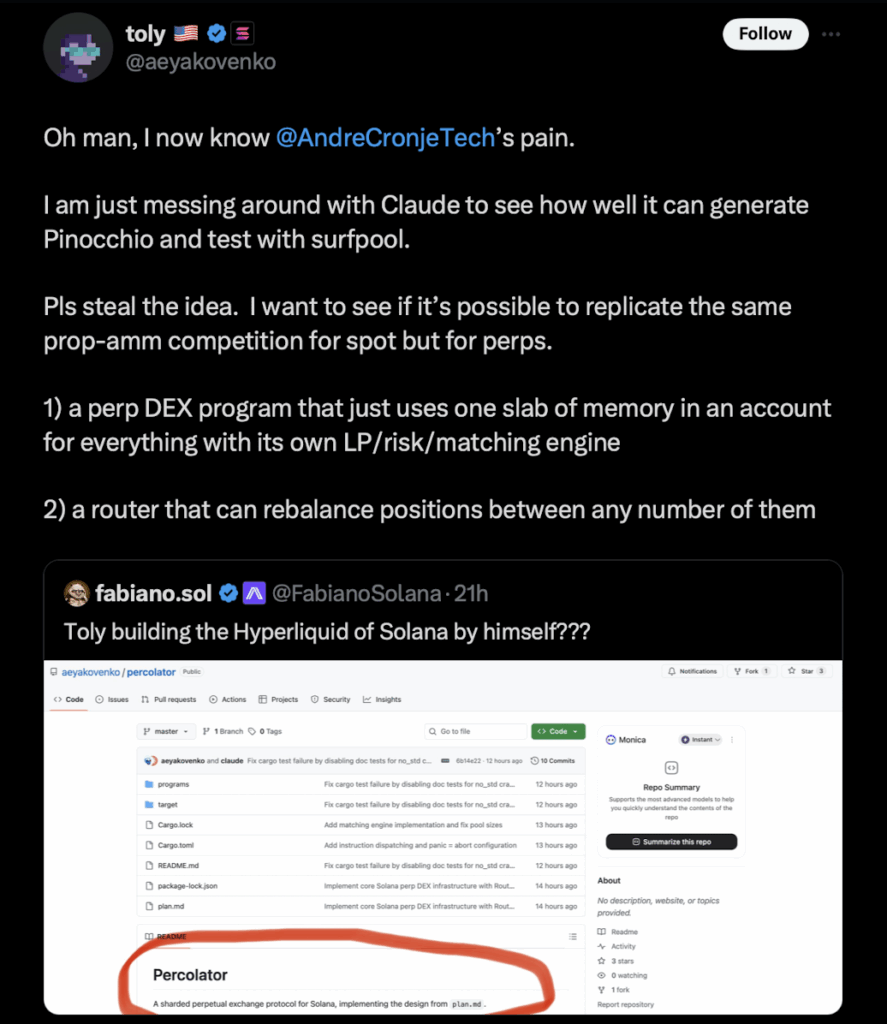- Solana co-founder Anatoly Yakovenko released a prototype DEX called Percolator and encouraged developers to “steal” the idea.
- The move sparked debates about open-source ethics and ownership in DeFi as the code hit GitHub.
- Supporters see it as innovation fuel for Solana, while critics warn it could lead to chaos and IP disputes.
Solana co-founder Anatoly Yakovenko just stirred up the DeFi space again, this time by openly telling developers to “steal” his new decentralized exchange concept. In a post on X, he revealed he’s been working on a prototype called Percolator, built with help from the AI tool Claude. And while it started as a casual experiment, it’s now become a full-blown debate about innovation, ownership, and open-source ethics in crypto.
The Percolator Prototype and Yakovenko’s Bold Move
Percolator is an on-chain perpetual futures DEX built entirely on Solana. It handles everything—margin, collateral, and position management—straight on-chain. The system uses a “slab” structure, which splits the matching engine by token pairs. That means faster execution and isolation between markets, so if one crashes, it doesn’t drag everything else down with it.
Yakovenko didn’t just tease the idea—he dropped the code on GitHub, probably by accident at first, but didn’t backtrack. Instead, he doubled down, encouraging others to take the idea and build their own versions. He wants to test whether the same competitive AMM behavior that drives spot markets could thrive in perpetual trading too. The GitHub repo shows that Percolator is still early—basic routing works, but liquidation and advanced risk modules are unfinished.

The Community Reacts: Excitement and Skepticism
The response was instant and divided. Andre Cronje from Yearn Finance joked, “Didn’t read. Aped. If I lose my money, I’m blaming you,” capturing the mix of curiosity and chaos that defines early crypto experiments. Developer @rinegade_sol simply wrote, “I’ll cook it,” implying they might try building it themselves. Others jumped in with feedback, suggesting clearer docs and AI-readable templates.
Still, not everyone’s impressed. Some developers warned that this open “steal it” culture blurs the line between collaboration and intellectual property theft. If someone takes Percolator, commercializes it, and profits, who gets credit? Who maintains it? These are the same issues that have haunted open-source DeFi for years—and Yakovenko’s move just reignited them.
A Risky Experiment or a New Wave of Innovation?
For Solana, the timing couldn’t be more strategic. With perpetual DEX volumes surpassing $210 billion in 2023, the network is hungry for a breakout product that can challenge heavyweights like GMX or Hyperliquid. Percolator could become that catalyst—or just another half-finished experiment left to GitHub history.
Supporters argue that Yakovenko’s openness could drive faster, community-led innovation. Letting developers build freely could strengthen Solana’s DeFi ecosystem while exploring how AI can assist in protocol design. But critics say it’s reckless—innovation without governance could easily turn chaotic, leading to copycats and fragmented liquidity.
Either way, Yakovenko’s “steal it” moment feels like a snapshot of Web3’s culture: fast, unpredictable, and defiantly open. Whether Percolator becomes a new foundation for Solana’s DeFi rise or fades into another experiment, one thing’s clear—this space thrives on bold moves like this one.














